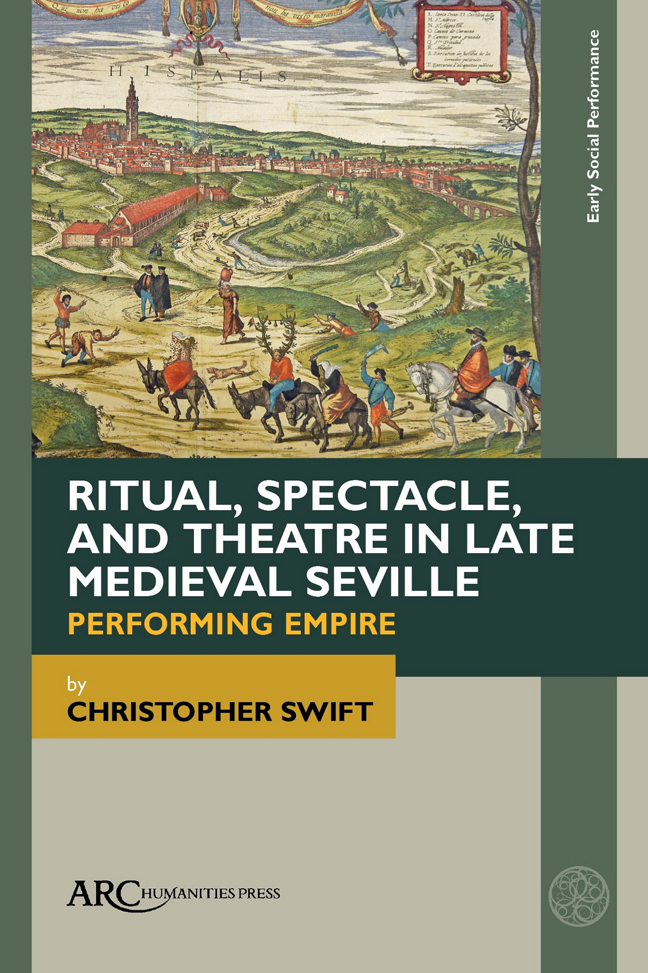Book contents
- Frontmatter
- Contents
- List of Illustrations
- Abbreviations
- Notes
- Acknowledgements
- Introduction. Theatres of Absence
- Chapter 1 The Cantigas de Santa Maria: Theatrical Acculturation of the Andalusi Colony
- Chapter 2 Penance, Conversion, and Affective Convivencia
- Chapter 3 Strange Infidels in the Imperial Metropole
- Conclusion. Walking Ghosts
- Bibliography
- Index
Chapter 2 - Penance, Conversion, and Affective Convivencia
Published online by Cambridge University Press: 22 February 2024
- Frontmatter
- Contents
- List of Illustrations
- Abbreviations
- Notes
- Acknowledgements
- Introduction. Theatres of Absence
- Chapter 1 The Cantigas de Santa Maria: Theatrical Acculturation of the Andalusi Colony
- Chapter 2 Penance, Conversion, and Affective Convivencia
- Chapter 3 Strange Infidels in the Imperial Metropole
- Conclusion. Walking Ghosts
- Bibliography
- Index
Summary
The ordinary practitioners of the city live “down below,” below the thresholds at which visibility begins. They walk—an elementary form of this experience of the city; they are walkers, Wandersmänner, whose bodies follow the thicks and thins of an urban “text” they write without being able to read it.
THE WORD CONVIVENCIA in the title of the chapter will, at first, seem misplaced. Even historians who place faith in the historiographic concept argue that, however one might define it, Convivencia had, for all purposes, ended after the outbreak of anti-Jewish violence across the Peninsula in 1391. However, as I discuss in the introduction, “living togetherness” of medieval Jews, Christians, and Muslims was never a utopian ideal, always required negotiations, often relied on laws of separation and inequality, and were marked by interreligious violence—in both Christian and Islamic realms. Many times throughout the Reconquista, for instance, diplomatic alliances and resolution of political conflicts between Muslims and Christians were negotiated through the theatre of hospitality and spectacles of violence. This took on a penitential character in Seville in 1360 when King Peter I of Castile mounted his guest-cum-prisoner Muhammad VI of Granada on an ass, dressed him in a scarlet robe, paraded him before his military escorts, and finally struck him with a lance as punishment for a past military loss. This chapter is about the ways in which acts of public penance and discipline contributed to the formation of religious and ethnic identities in fifteenth- and sixteenth-century Seville. The growth of public spectacles during this period can be better understood in the context of interreligious relationships, from peaceful expressions of communal cooperation to inflammatory acts of coercion.
In the early fourteenth century in Seville, when the culture of outdoor, public processions and spectacles grew, Muslims and Jews celebrated the royal entries of Christian monarchs. More unexpectedly, the minority religious groups also participated in parades of Easter and Corpus Christi. According to Nathan Robert Dodgen, these events suggest “a normal social relationship between the minorities that simply carried with it the baggage of rivalry when it came to ‘performing’ before the majority authorities.” It is not clear if competition between Muslims and Jews was the true motivational factor. The processional routes of Christian festivals often crossed into Jewish and Muslim aljama and so participation was, to a degree, a matter of spatial necessity.
- Type
- Chapter
- Information
- Ritual, Spectacle, and Theatre in Late Medieval SevillePerforming Empire, pp. 87 - 126Publisher: Amsterdam University PressPrint publication year: 2023

